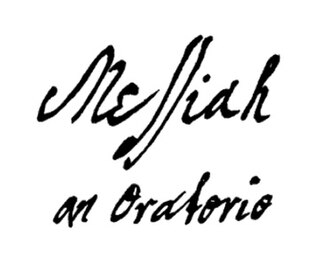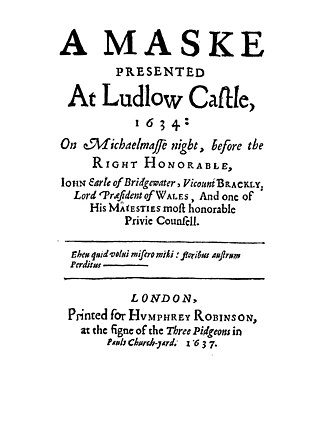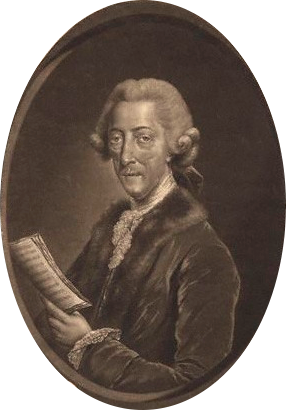Related Research Articles

Messiah is an English-language oratorio composed in 1741 by George Frideric Handel. The text was compiled from the King James Bible and the Coverdale Psalter by Charles Jennens. It was first performed in Dublin on 13 April 1742 and received its London premiere a year later. After an initially modest public reception, the oratorio gained in popularity, eventually becoming one of the best-known and most frequently performed choral works in Western music.

Samson is a three-act oratorio by George Frideric Handel, considered to be one of his finest dramatic works. It is usually performed as an oratorio in concert form, but on occasions has also been staged as an opera. The well-known arias "Let the bright Seraphim", "Total eclipse" and "Let their celestial concerts" are often performed separately in concert.
In Greek mythology, Comus or Komus is the god of festivity, revels, and nocturnal dalliances.

Acis and Galatea is a musical work by George Frideric Handel with an English text by John Gay. The work has been variously described as a serenata, a masque, a pastoral or pastoral opera, a "little opera", an entertainment and by the New Grove Dictionary of Music as an oratorio. The work was originally devised as a one-act masque which premiered in 1718.

Comus is a masque in honour of chastity written by John Milton. It was first presented on Michaelmas 1634 before John Egerton, 1st Earl of Bridgewater at Ludlow Castle in celebration of the Earl's new post as Lord President of Wales.

Giove in Argo is an Italian opera by George Frideric Handel. It is one of Handel's three pasticcio works made up of music and arias from his previous operas. The libretto was written by Antonio Maria Lucchini. The opera was first performed at the King's Theatre, Haymarket, London, on 1 May 1739.

Esther is an oratorio by George Frideric Handel. It is generally acknowledged to be the first English oratorio. Handel set a libretto after the Old Testament drama by Jean Racine. The work was originally composed in 1718, but was heavily revised into a full oratorio in 1732.

La resurrezione, HWV 47, is an oratorio by George Frideric Handel, set to a libretto by Carlo Sigismondo Capece (1652–1728). Capece was court poet to Queen Marie Casimire of Poland, who was living in exile in Rome. It was first performed on Easter Sunday, 8 April 1708 at Rome, with the backing of the Marchese Francesco Ruspoli, Handel's patron at this time. The work details the events between — and during — Good Friday and Easter Sunday, with the action carried forward in recitative, and exploration of character and delineation of mood taking place in the arias. The characters of the liturgical drama that appear in the oratorio are Lucifer (bass), Mary Magdalene (soprano), an angel (soprano), John the Evangelist (tenor), and Mary Cleophas (alto).

Aci, Galatea e Polifemo is a serenata for three voices by George Frideric Handel. It was first performed at Naples on 19 July 1708; the completed score is dated to 16 June 1708. A sort of dramatic cantata, the work was commissioned by Duchess Donna Aurora Sanseverino for the wedding of Tolomeo Saverio Gallo, Duke of Alvito, and Beatrice Tocco di Montemiletto, Princess of Acaja and the duchess's niece. Its Italian libretto was by Nicola Giuvo, secretary and adviser to the duchess, and it prefigures that of Handel's 1718 English-language masque Acis and Galatea, although Handel drew little on the music of the serenata when he prepared the masque. In the serenata the cyclops' role entails actions with lethal consequences for Aci and is notable for its range and the vocal agility it requires; it rises from the D below the bass staff to the A above it — and that in its satirical, ponderous buffa aria, "Fra l'ombre e gl'orrori"; it may have been taken at the premiere by the bass Antonio Manna, who sang at the court chapel in Vienna.

Joshua is an oratorio by George Frideric Handel. It was composed in a month, from 19 July 1747 to 19 August 1747, six months before the beginning of the oratorio season. Joshua is Handel's fourth oratorio based on a libretto by Thomas Morell. The oratorio premiered on 9 March 1748 at the Covent Garden Theatre, London. Joshua is based on the Biblical story of Joshua as the leader of the ancient Israelites. The story follows the Israelites from their passage over the Jordan River into Caanan and through the Battle of Jericho. The work also includes a love story elaborated from a few hints in the Biblical narrative between Caleb's daughter Achsah and Othniel, a young soldier.

An Occasional Oratorio is an oratorio by George Frideric Handel, based upon a libretto by Newburgh Hamilton after the poetry of John Milton and Edmund Spenser. The work was written in the midst of the Jacobite rising of 1745–1746, the attempt to overthrow Handel's patrons – the Hanoverian monarchy under George II – and replace them with a Stuart restoration under Charles Edward Stuart, "Bonnie Prince Charlie". The Occasional Oratorio is unique among Handel's works which he labelled "oratorio" in that it does not tell a story or contain elements of a drama, but was intended as a defiant and patriotic rallying piece.
Cecilia Young was one of the greatest English sopranos of the eighteenth century, the wife of composer Thomas Arne, and the mother of composer Michael Arne. According to the music historian Charles Burney, she had "a good natural voice and a fine shake [and] had been so well taught, that her style of singing was infinitely superior to that of any other English woman of her time". She was part of a well-known English family of musicians that included several professional singers and organists. Young enjoyed a large amount of success through her close association with George Frideric Handel. She appeared in several of his oratorios and operas including the premieres of Ariodante (1735), Alcina (1735), Alexander's Feast (1736) and Saul (1739).

Thomas Lowe was an English tenor and actor. He appeared at the Theatre Royal, Drury Lane and at Covent Garden, and frequently performed in London's pleasure gardens. He was particularly associated with the works of Thomas Arne and George Frideric Handel.

Comus is a masque in three acts by English composer Thomas Arne. The work uses a libretto by John Dalton (1709-1763) that is based on John Milton's 1634 masque of the same name. The work was first performed at the Theatre Royal, Drury Lane, London, on 4 March 1738.

Giulia Frasi was born c. 1730 and died in 1772 or after May 1774. She was an Italian soprano who was primarily active in London. She sang in every one of Handel's English oratorios, including various world premières for which the composer wrote roles specifically for her.

Messiah, the English-language oratorio composed by George Frideric Handel in 1741, is structured in three parts, listed here in tables for their musical setting and biblical sources.

Messiah, the English-language oratorio composed by George Frideric Handel in 1741, is structured in three parts. The wordbook was supplied by Charles Jennens. This article covers Part I and describes the relation of the musical setting to the text. Part I begins with the prophecy of the Messiah and his virgin birth by several prophets, namely Isaiah. His birth is still rendered in words by Isaiah, followed by the annunciation to the shepherds as the only scene from a Gospel in the oratorio, and reflections on the Messiah's deeds. Part II covers the Passion, death, resurrection, ascension, and the later spreading of the Gospel. Part III concentrates on Paul's teaching of the resurrection of the dead and Christ's glorification in heaven.

Messiah, the English-language oratorio composed by George Frideric Handel in 1741, is structured in three parts. This listing covers Part II in a table and comments on individual movements, reflecting the relation of the musical setting to the text. Part I begins with the prophecy of the Messiah and his birth, shows the annunciation to the shepherds and reflects the Messiah's deeds on earth. Part II covers the Passion in nine movements including the oratorio's longest movement, an air for alto He was despised, then mentions death, resurrection, ascension, and reflects the spreading of the Gospel and its rejection. The part is concluded by a scene called "God's Triumph" that culminates in the Hallelujah chorus. Part III of the oratorio concentrates on Paul's teaching of the resurrection of the dead and Christ's glorification in heaven.

Messiah, the English-language oratorio composed by George Frideric Handel in 1741, is structured in three parts. This listing covers Part III in a table and comments on individual movements, reflecting the relation of the musical setting to the text. Part I begins with the prophecy of the Messiah and his birth, shows the annunciation to the shepherds as a scene from the Gospel of Luke, and reflects the Messiah's deeds on Earth. Part II covers the Passion, death, resurrection, ascension, and the later spreading of the Gospel. Part III concentrates on Paul's teaching of the resurrection of the dead and Christ's glorification in heaven.
References
- ↑ Marian Van Til George Frideric Handel: A Music Lover's Guide to His Life Page 209 2007 -"... turned The piece that Handel composed for their entertainment was There in the Blissful Shades (HWV * 44), a short version of Milton's Comus, based on a libretto by John Dalton for composer Thomas Arne (Burrows, Handel, p. 285, n1)."
- ↑ http://www.hyperion-records.co.uk Handel: The Occasional Oratorio - CDA66961/2 libretto notes "The tenor aria 'Then will I Jehovah's praise' also has its origins in another work, the Masque Comus: during his recuperation in the summer of 1745 at the seat of the Earl of Gainsborough Handel contributed a handful of movements to the.."
- ↑ Handel, The Academy Of Ancient Music, Christopher Hogwood - Alceste • Comus, 1989, retrieved 9 June 2023
- ↑ "Handel at Vauxhall, Vol.2". Signum Records. Retrieved 9 June 2023.